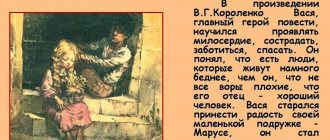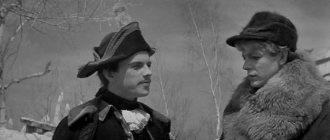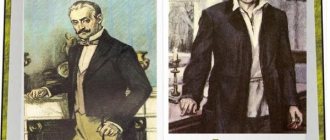- Essays
- Literature
- Korolenko
/
/
“Children of the Dungeon” - this story was written by the writer V. Korolenko quite a long time ago. But reading it, at different times, different people could not remain indifferent. The story tells not only about poverty and indifference, but also about mercy and compassion.
In the ruins of the castle, on one of the islands of the numerous ponds of Knyazh - the city, lived beggars and various mysterious personalities. The children living there in poverty one day, by chance, meet the boy Vasya. He comes from a wealthy family, but after his mother’s death he began to feel unnecessary. A nanny took care of his younger sister, and Vasya increasingly ran away from home for a walk.
It just so happened that the new friends, and they quickly became friends, became very close to Vasya. He began to visit their dungeon often. The boy wanted to somehow help his friends – Valk and little Marusya. He treated them to apples from his garden and sweets. This is the first time Vasya has encountered poverty so closely, and here a friendship has arisen between the children. He felt very sorry for Marusya; she was as small as his sister. But because of the conditions in which they lived, she was always pale and sad. Valek once said that in this dungeon “the gray stone sucked the life out of her.”
The children in the dungeon are looked after by an adult - Tyburtsy. Em doesn't like it at all that the children made friends with the judge's son. But he loves Valka and Marusya and, seeing how the children rejoice in friendship, does not forbid them to meet.
Always hungry, little Marusya became completely ill by autumn. Vasya, not knowing how to help the unfortunate girl, decided to ask his sister for a doll. At least for a while. The magnificent toy gave strength to the sick girl and breathed a drop of joy into her.
And Vasya started having troubles. The doll's disappearance has been discovered. The boy was summoned to his father and literally interrogated. Vasya steadfastly endured all the accusations of theft. But he and Valk failed to return the doll. Marusya's quiet tears stopped them. They could not take away the last crumbs of joy from her.
Vasya was placed under house arrest, prohibiting him from leaving the house.
But the appearance of Tyburtsy in their house with a doll changed Father Vasily’s opinion. Having learned about his son’s noble deed, the judge was ashamed of his behavior. He allowed Vasya to say goodbye to the dead girl and even gave money to the poor.
After some time, Valek and Tyburtsy disappeared not only from the castle, but also from the city. And Vasya and his sister Sonya began to often go to Marusa’s grave.
This sad event helped not only Vasya to discover that there are real human values in the world. Understand that warmth and compassion have great power.
You don't need to consider yourself better than others just because your dad occupies a high position.
Analysis of the story “Children of the Dungeon”
In his work, V. Korolenko wanted to show life in all its diversity. The idea of the work is to show how life circumstances influence the characters of the main characters.
The little boy Vasya lost his mother early and is raised, together with his sister Sonya, by a strict father. The father is cold towards the boy and therefore Vasya grows up like a “shy animal.” The boy suffers from loneliness and misunderstanding.
One day he meets tramps who lived outside the city: boys Valkom, about the same age as Vasya, his sister, four-year-old Marusya, and their adoptive father Pan Tyburtsim. The tramps lived in an abandoned chapel next to the cemetery, and went into the city to steal food.
When Vasya came to visit them, he couldn’t believe his eyes. How can children live in a dark, damp basement? This is how Vasya learned what injustice is. After what he saw, he no longer condemned the vagabond thieves. And the more Vasya interacted with vagabonds, the more he felt social inequality and the more his relationship with his father deteriorated.
The boys spent a lot of time together, which Vasya’s father did not like. One day Marusya became seriously ill. She lay in the dungeon on damp, cold stones and could not recover.
Vasya was very worried about Marusya, the children became close, and decided to please her, to make her happy. He gave the girl her sister's doll, which her late mother had given her. The girl was delighted, she even felt better for a little while. Vasya’s father was furious; he could not understand his son. Marusya soon died, the doll was returned, and the tramps left for another city.
Vasya and his father discovered a new stage in their relationship, the cold was replaced by warmth and love.
In this work, the author wanted to show that the world can be cruel and unfair. But even in such a world you need to have such qualities as kindness, mercy, understanding and humanity. The author says that one cannot be indifferent to the problems of other people.
I liked V. Korolenko’s story “Children of the Dungeon.” This story is interesting and instructive.
Essay 2
Korolenko, as an author, and as a person, was very rich in emotions and expression of his feelings. Anything could throw him out of balance into almost any emotional state, which also greatly affected the author’s works themselves. In his works, the author very often turned to the themes of human nature and its component - emotions, most of them good. He often said, and also noted in his works, that at this time there is a strong decline in the emotionality of human society, which is why people forget about the simplest human joys and think only about the material component of life. An example of such a work would be “Children of the Dungeon.”
In the work “Children of the Dungeon,” the author introduces us to several children who carry one or another theme of the work. The fate of each of them is very unenviable, and therefore the reader begins to sympathize with them as the plot of the work develops. The work also touches on themes that are quite emotionally strong for the reader. These are social themes that, one way or another, are present in our lives, which the author would like to convey to his reader.
The main theme in the work is that very often people forget about their hearts, starting to be guided only by cold calculations, which is why they also begin to experience pain and irritation. He says that the material component of our life is by no means the most important thing in it, and therefore it is important to remember that there are more sublime things than just generating income and building your material well-being. He also points out another problem of the work, which is present in several characters in the work.
He says that very often people with a difficult fate can heal someone’s heart, because they know what is truly valuable, because they had to face quite tragic events that, one way or another, left a mark on their character. They were able to get through a fairly difficult period in their lives in order to subsequently become stronger. Thus, the author shows that a person, having gone through any adversity, only becomes stronger, and therefore can call himself a fairly strong person only because he had to go through bad things, maybe even terrible ones.
Other topics: ← Impression from the story in Bad Society↑ KorolenkoSonya In Bad Society →
`
Essay on the story Children of the Dungeon
I was impressed by Korolenko’s story “Children of the Dungeon.” And the impressions are not always pleasant, but always strong. If everything were just pleasant and beautiful, then it would be a fairy tale. Everything here is too similar to real life, which can be cruel.
The name itself evokes thoughts of something scary, although still fabulous. The castle itself, which stood on one of the bulk islands near the town, had terrible fame. They said that hundreds of prisoners were buried in the dungeons, who built the castle. These were the Turks. That’s what I imagined when I read how it seemed to everyone in the book that the groans of the unfortunate were heard from underground.
Of course, only those who had nothing to lose lived in the castle. It’s funny that the expression “he lives in a castle” got the opposite meaning, that is, he is not a rich count, but a beggar. I just didn’t understand why these already unfortunate people couldn’t live in peace!
They constantly quarreled, fought, and even started a war of beggars, as a result of which half of the poor were expelled from the castle. Those who remained there, and also on the porches of the churches, were only “decent” poor people, for example, ugly old women in caps. In general, the dungeons were, in every sense, a scary place.
But they did not frighten the main character, but attracted him. I liked the character of this boy. Vasya is brave and freedom-loving. It’s just that I grew up in difficult conditions, of course. His mother died young. Her father (the judge) loved her very much. During her life, she did not particularly notice her children because of her happiness, and after her death, because of her grief.
Although no, he sometimes remembered his little sister, since she looked like his mother, but he forgot his son. The nanny didn't even allow him to play with his sister! Therefore, he began to leave home early in the morning, wander around all day, and only spend the night at home. And that's rare.
Everyone considered him a tramp, scolded him... The stern father sometimes began to educate, but simply because he had to. He didn’t show his love or even his grief.
So, the turning point of the story, I think, is meeting two beggar children in the dungeon. The friends got scared - they abandoned Vasya among the “devils” and ran away. And he, unexpectedly, found real friends: Valek, the son of the “main” beggar, and his sister Marusya.
She was sick due to poverty and cold, and the gift of a new friend (her sister’s doll) consoled her a little. The father decided that he had stolen it from his sister. And he probably sold it. But then Valek’s father appeared at the judge’s house, thanked the boy, and returned the doll, since the unfortunate Marusya had died.
I think the judge felt ashamed. Only such a shock could turn him towards his own son.
Children of the Dungeon essay on the topic
The main character of Korolenko’s story “Children of the Dungeon” The main character of Korolenko V.G.’s story “Children of the Dungeon” is Vasya. When Vasya's mother died, he was six years old. The father completely forgot about him, completely surrendering to his grief. Vasya grew up like a wild tree in a field - no one surrounded him with care, but no one restrained his freedom. Vasya lived in Prince Town, where the pitiful remains of the proud lord’s greatness lived out their days. The city lies below moldy ponds. Gray fences, vacant lots with heaps of rubbish moved with the huts sunk into the ground. The wooden bridge groaned and staggered like a decrepit old man. The river over which the bridge was built flowed from a pond and flowed into another. There was an island in the middle of one of the ponds. On the island there is an old, dilapidated castle. Vasya always looked at this majestic, decrepit building with fear. Any poor person could find refuge in the old castle. “Lives in a castle” - this phrase expressed the extreme degree of poverty and decline. But one day the castle society was divided. Vasya and his friends watched as the expulsion of the residents took place. And the unfortunate dark personalities, dejected, left the island forever. After this, the old castle, from which Vasya had previously felt some kind of grandeur, lost all its attractiveness in his eyes. Vasya could not forget the cruelty with which the residents of the castle persecuted their unfortunate roommates who were left homeless; his heart sank. Using the example of the old castle, Vasya first learned the truth that from the great to the ridiculous there is only one step. The great things in the castle were overgrown with ivy and mosses, and the funny things seemed disgusting to Vasya. The most remarkable person who did not live in the old castle is Tyburtius Drat. Its origin was unknown. Mr. Drat's appearance did not have a single aristocratic feature, but his eyes, sparkling from under his overhanging eyebrows, looked stubbornly and gloomily, and in them shone, along with slyness, sharp insight, energy and a remarkable mind. A deep, unremitting sadness flowed through them. No one knew where Pan Tyburtsy’s children came from. A boy of about seven years old, tall, thin, black-haired, sullenly staggering around the city, and a little three-year-old girl. Since Vasya’s mother died and his father’s face became even more gloomy, he was very rarely seen at home. Vasya tried to avoid meeting his father. When everyone was still sleeping in the house, Vasya climbed over the fence and walked to the pond, where the same tomboyish comrades were waiting for him. Vasya was called a tramp, a worthless boy, and was so often reproached for other inclinations that he himself believed it. The father also believed this and made attempts to raise his son, but it all ended in failure. Seeing his father’s stern, gloomy face, on which lay the stern mark of incurable grief, Vasya became timid and withdrawn into himself. The boy wanted his father to hug him, sit him on his lap and caress him, but the father looked at his son with hazy eyes, and he shrank all under this gaze, incomprehensible to him. Father often asked Vasya: “Do you remember mother?” Of course, Vasya remembered her. After the death of his mother, for the first time the whole horror of the riddle about life and death was revealed to Vasya. As before, it seemed to him that she was with him, that now he would meet her sweet caress, but his hands stretched out into the empty darkness, and the consciousness of bitter loneliness penetrated his soul. Then he squeezed his small, painfully pounding heart with his hands, and tears burned hot streams through his cheeks. But when asked by the tall, gloomy man, in whom Vasya wanted, but could not feel, a kindred soul, he cowered even more and quietly pulled his little hand out of his hand. And the father turned away from his son with annoyance and pain. There was some kind of insurmountable wall between them. Loving his mother when she was alive, his father did not notice Vasya because of his happiness. Now Vasya was shielded from him by severe grief. And gradually the abyss that separated them became wider and deeper. The father became more and more convinced that his son was a bad, spoiled boy, with a callous, selfish heart. The father understood that he must love him, but not find a corner for this love in his heart. Vasya felt it. Watching his father, hearing his muffled groans from unbearable mental anguish, the boy’s heart lit up with pity and sympathy. Vasya cried with frustration and pain. From the age of six he experienced the horror of loneliness. Sister Sonya was four years old. Vasya loved her, and she repaid him with the same love. But the established gaze on Vasya erected a high wall between them. Vasya was bitter and annoyed. And soon he stopped all attempts to occupy Sonya with games, and after a while he felt cramped in the house and in the kindergarten, where he did not find greetings or affection from anyone. Vasya began to wander. It seemed to him that behind the old garden fence he would find something and maybe do something, towards this unknown and mysterious, something rose in him from the depths of his heart, teasing and challenging. Since then he was called a street boy and a tramp, but he did not pay attention to this. He listened to comments and acted his way. Staggering through the streets, he observed the life of the town. He learned and saw something that children much older than him had not seen. When the castle lost respect and attractiveness for Vasya, then he began to look at the chapel. Plucking up courage, Vasya looked inside the chapel, and from there he smelled solemn silence. There he saw a boy of about nine and a girl with blue eyes. From then on, Vasya was completely absorbed in his new acquaintance. Going to bed and getting up, he only thought about the visit to the chapel. Marusya, at the sight of her new friend, clasped her little hands, and her eyes lit up, her pale face flushed with blush, and she laughed. She was like a flower that grew without the rays of the sun. She reminded Vasya of his mother in the last days of her life. From Valka, Vasya learned that the gray stone was sucking the life out of her. There was a bitter truth in these words. It was a mystery for Vasya, more terrible than all the ghosts of the old castle. Something unknown was bending over the girl’s little head, sucking out her blush, the sparkle in her eyes and the liveliness of her movements. Vasya and Valk collected flowers and colorful stones for the girl, caught butterflies, told fairy tales or talked with each other. These conversations every day more and more strengthened the boys' friendship, which grew, despite the sharp contrast of their characters. Valek showed Vasya his father from a side from which it had never occurred to him to look at him. He was pleased to hear his father's praises. Slava Valka struck a chord of filial pride in Vasya’s heart. Autumn was approaching. Marusya began to get sick. Everything that amused and interested Vasya in these people on the streets, here in the dungeon, appeared in an unvarnished form and weighed heavily on the child’s heart. When these pictures and people arose in Vasya’s memory, he saw grief, need, tragedy. Vasya finally got used to bad society, Marusya’s sad smile became as dear to him as his sister’s smile. Here he was needed, here no one pointed out his depravity. His every appearance caused a blush and animation on the girl’s cheeks. Valek hugged him like a brother. The clear days passed, and Marusya became worse. Nothing made her happy anymore, and her laughter had not been heard for a long time. Then Vasya decided to turn to his sister Sonya. She had a large doll, a gift from her late mother. Vasya had high hopes for this doll. Vasya was not mistaken. The little doll did a miracle, but also brought many anxious moments. Vasya told Valk his concerns. It was decided to return the doll back. As soon as the boys took the doll out of the hands of the girl lying in oblivion, she suddenly began to cry. Vasya put the doll in its place with fear. The girl smiled and calmed down. Vasya realized that he wanted to deprive his little friend of the first and last joy of her short life. Vasya was waiting for a serious conversation with his father. He called him into his office. Vasya heard the alarming beating of his own heart. Vasya found his father’s face scary. Vasya's father accused him of theft. The father's eyes burned with anger. A barely conscious, offended feeling of an abandoned child rose in the boy’s chest. Bitter tears burned his cheeks. At that moment Tyburtsy's voice was heard. He untied the knot and took out the doll. The father's face showed amazement. They went out . A few minutes later they returned. Vasya felt someone's hand on his head. It was his father's hand, gently stroking him. Vasya looked up at him. Now a different person stood in front of Vasya, but it was in this person that he found something familiar, which he had sought in vain in him before. And the father only now began to recognize in Vasya the familiar features of his own son. We believe that Korolenko’s work reflects the facts of his biography. As you read, you are amazed at the sincerity and power of the author’s word. We empathize with the characters, imbued with their thoughts and concerns. In the main characters of Vasya, we see a reflection of the life of the writer himself. In our opinion, this is a strong and courageous person, kind and intelligent, capable of understanding people. He, like his main character, knows how to sympathize and sympathize. Respect for a person, the fight for him is the main thing in the life and work of a writer. The heroes of his works are ordinary Russian people. Korolenko’s work teaches us not to be afraid of life, to accept it as it is, and not to bow our heads in the face of difficulties.
Similar articles:
Essays on the Russian language > Essay “Children of the Dungeon” 5th grade Essays on the Russian language > Essay “Children of the Dungeon” 6th grade Essays on the Russian language > Essay based on the story by V. Korolenko “Children of the Dungeon” Essays on the Russian language > The role of “bad society” in the life of Vasya, the hero of V. G. Korolenko’s story “Children of the Dungeon” Essays on the Russian language > Children of the Dungeon - essay on the story
What is Korolenko's story about - plot
Filled with tragedy and ideological assessment of the justice of actions, the story of Vladimir Korolenko “Children of the Dungeon” can in fact be called an example of real friendly relations and compassion.
The main issue raised in the work is need, both physical and internal. Being a literary creator-philanthropist, Korolenko devotes a lot of lines to this social issue in his literary work, forcing everyone to think about their preferences in this issue.
The plot begins in a Polish city of the 19th century. Teenager Vasily, the son of a judge, lives a peaceful and comfortable life, the only problem in which is the indifference of his father, who was an objective and conscientious judge, who is completely undeservedly isolated from his son after the death of his mother, focusing his care specifically on his daughter Sofia, because she was very looks like her.
Vasily lives the life of a hermit in his spiritual shell, which crumbles precisely in that time period when he comes face to face with the homeless - Valk and Marusya, who are forced to beg and steal in order to somehow survive for a while. Their usual day is a struggle for existence. It begins with a cave, cold and lack of food.
At first, a teenager perceives contact with “bad people” as unfamiliar entertainment. Then his perception of vital processes and everyday laws gradually changes, and at the moment of the highest tension of Marusya’s painful condition and death, his new perception of what is white and what is black opens.
Realizing that theft is a one-way road, he, however, in front of his dad’s eyes, “steals” a doll for Marusya (a souvenir from his mother, received with his sister’s permission). When dad finds out where the lost doll is, which Tibaltsy gives back after the death of Marusya, he understands the seriousness of the prank of his own son, who presented it as a gift to a sick and disadvantaged girl and gave her at least some delight in one of the days of her life.
Dad asks for forgiveness to his son and ultimately breaks the invisible barrier between them. The totality of problems of mental shock and isolation in this place is revealed in a “wedge by wedge” type: the abyss and hopelessness created by one drama is smoothed out by the next drama.
The main internal motivation of the writer in this literary work is that lack of money personifies the entire social layer of problems that in one way or another disturb the psychological area of any individual.
The writer recommends that you start transforming the world for the good, and you need to start with yourself, demonstrating compassion and mercy. Do not be insensitive to the difficulties of other people, because in fact this is the spiritual poverty of the individual.
Theme of Poverty (Children of the Dungeon)
Our class teacher gave us a very sad book “Children of the Dungeon” to read. Its author, V.G. Korolenko, raised the topic of poverty in this book.
In the book, the main character is a little boy, his name is Vasya. He lived in a run-down town called Knyazhye-Veno. One day, out of curiosity, Vasya climbed into the old chapel and met there a boy named Valek and a little girl Marusya, who later became his best friends.
Valek is a boy of about seven years old, like Vasya. He is dressed in rags. Marusya is a girl of only four years old. She has beautiful hair, she is very pale and dressed in the same rags as Valek.
Valek and Marusya were poor and therefore could not go to school. They didn’t have enough to eat, they had no clothes, no toys, and in general, they had nothing but a damp cave and a loving father, Mr. Tyburtsy.
Sometimes Valek stole in order to survive and feed his beloved sister. On top of everything else, all the beggars, Valek, and Pan Tyburtsy were hiding from the police and the judge. Many beggars died from lack of food and from the lack of a normal home.
And Marusya suffered the same fate - she died while still very young. I am very sorry that she died, because she could live and live and enjoy life, but instead of joy she received death.
I didn't like this book, but I guess the author wanted us to pay more attention to the poor. Overall, this is a good book, but very, very sad.







